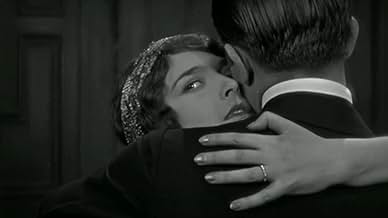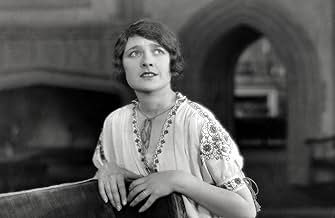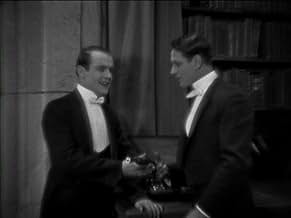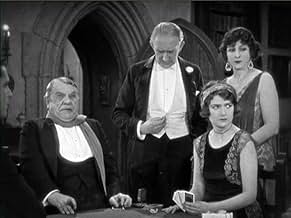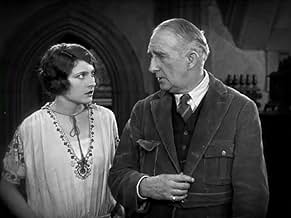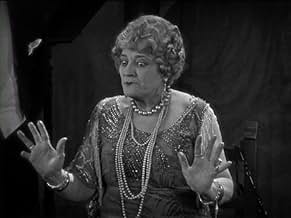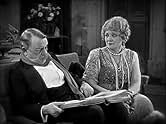Aggiungi una trama nella tua linguaAn unhappy woman considers leaving her dull husband for another man.An unhappy woman considers leaving her dull husband for another man.An unhappy woman considers leaving her dull husband for another man.
- Regia
- Sceneggiatura
- Star
Recensioni in evidenza
The Circle (1925)
** 1/2 (out of 4)
Frank Borzage's mix of comedy and drama has Elizabeth Cheney (Eleanor Boardman) wanting to leave her husband for her better lover but the woman knows that her husband's mother did the same thing to his father thirty years earlier. At a weekend party, the husband's mother, who he hasn't seen since she left, comes for a visit and is bringing the lover along as Elizabeth wants to see what would happen if she ran away. THE CIRCLE is something that I'm really not sure how to describe. I wouldn't call it a good movie but I think it has some fairly interesting aspects but it also had some downright weird moments. I'm really not sure what Borzage was trying for here unless he was just wanting to show that everything comes full circle. The first portion of the film is clearly a drama and things are going this direction throughout the majority of the movie but then it turns to a comedy when we're in current days. The mother's lover is a complete loud mouth who is constantly complaining about everything. This comedy attempt is the way the film says that it's best to stay who you're with but making an example out of this guy really served no purpose. Even stranger from the film is that his character is constantly cussing but in the intertitles they have certain letters marked out. Hell becomes "H--l" and damn becomes "D--m" and so on. The performances in the film are all over the place but Boardman is extremely good in the lead role and she does receive nice support from Malcolm McGregor and Alec Francis. George Fawcett appears as the obnoxious lover and we even seen a very young Joan Crawford playing the mother during the opening sequences. THE CIRCLE isn't going to appeal to everyone and it's mostly silent film buffs who will take the most from it.
** 1/2 (out of 4)
Frank Borzage's mix of comedy and drama has Elizabeth Cheney (Eleanor Boardman) wanting to leave her husband for her better lover but the woman knows that her husband's mother did the same thing to his father thirty years earlier. At a weekend party, the husband's mother, who he hasn't seen since she left, comes for a visit and is bringing the lover along as Elizabeth wants to see what would happen if she ran away. THE CIRCLE is something that I'm really not sure how to describe. I wouldn't call it a good movie but I think it has some fairly interesting aspects but it also had some downright weird moments. I'm really not sure what Borzage was trying for here unless he was just wanting to show that everything comes full circle. The first portion of the film is clearly a drama and things are going this direction throughout the majority of the movie but then it turns to a comedy when we're in current days. The mother's lover is a complete loud mouth who is constantly complaining about everything. This comedy attempt is the way the film says that it's best to stay who you're with but making an example out of this guy really served no purpose. Even stranger from the film is that his character is constantly cussing but in the intertitles they have certain letters marked out. Hell becomes "H--l" and damn becomes "D--m" and so on. The performances in the film are all over the place but Boardman is extremely good in the lead role and she does receive nice support from Malcolm McGregor and Alec Francis. George Fawcett appears as the obnoxious lover and we even seen a very young Joan Crawford playing the mother during the opening sequences. THE CIRCLE isn't going to appeal to everyone and it's mostly silent film buffs who will take the most from it.
This is a very good silent film that tests out the old expression "Like father, like son".
When the film begins, Clive doesn't realize that his beloved wife, Catherine, is cheating on him. She unexpectedly runs away with Clive's best friend...leaving Clive and her young son to fend for themselves.
Thirty years pass. The son, Arnold, has married Elizabeth and while he doesn't realize it, trouble is brewing...similar to his parents. Elizabeth has invited Arnold's mother and step-father to their estate. But her reasons suck...she wants to find out how well things went for them following their affair. She has a romantic notion that the pair were deliriously happy...and she's contemplating running off with some young buckaroo herself. Fortunately, Clive is not supposed to be home during this meeting between mother and son--the first in 30 years. However, Clive DOES end up returning early and the reaction is NOT what everyone expected. He was very happy to see his wife and old friend...and harbors no bitterness! What about Arnold? Well, see the film and find out for yourself.
This is a very clever film that deals with adultery in a very grown up and realistic manner (at least in some ways). It also is very well written and acted...so if you think you'll hate silents, it's a good bet this one will keep you entertained.
When the film begins, Clive doesn't realize that his beloved wife, Catherine, is cheating on him. She unexpectedly runs away with Clive's best friend...leaving Clive and her young son to fend for themselves.
Thirty years pass. The son, Arnold, has married Elizabeth and while he doesn't realize it, trouble is brewing...similar to his parents. Elizabeth has invited Arnold's mother and step-father to their estate. But her reasons suck...she wants to find out how well things went for them following their affair. She has a romantic notion that the pair were deliriously happy...and she's contemplating running off with some young buckaroo herself. Fortunately, Clive is not supposed to be home during this meeting between mother and son--the first in 30 years. However, Clive DOES end up returning early and the reaction is NOT what everyone expected. He was very happy to see his wife and old friend...and harbors no bitterness! What about Arnold? Well, see the film and find out for yourself.
This is a very clever film that deals with adultery in a very grown up and realistic manner (at least in some ways). It also is very well written and acted...so if you think you'll hate silents, it's a good bet this one will keep you entertained.
There's the gorgeous lady and her lover;there's the husband.One night ,she leaves him in a romantic manner...
But what follows happens thirty years after.And Frank Borzage tramples the golden principles underfoot .Gone is the old cliché,as old as the hills,of the romantic lovers.The beauty has become a sour-tempered pudgy old lady while the dashing attentive escort has grown into a grumpy sullen less-than-attractive greybeard.And finally it's the cheated husband who walks out with the honors:he has kept his dignity and he will do everything to spare his son the same fate as his.The characters,mainly in the card games sequence,are vividly depicted.
But what follows happens thirty years after.And Frank Borzage tramples the golden principles underfoot .Gone is the old cliché,as old as the hills,of the romantic lovers.The beauty has become a sour-tempered pudgy old lady while the dashing attentive escort has grown into a grumpy sullen less-than-attractive greybeard.And finally it's the cheated husband who walks out with the honors:he has kept his dignity and he will do everything to spare his son the same fate as his.The characters,mainly in the card games sequence,are vividly depicted.
The Circle by Somerset Maugham is one of those dated stories of adultery among the upper classes of England where no one behaves much like a recognizable human being (see Maugham's charming and more satisfying The Constant Wife). This stage to screen adaptation succeeds more than expected, largely because of intelligent direction by Frank Borzage and a great performance by supporting player Eugenie Besserer. Lead actress Eleanor Boardman is a beauty but at a disadvantage in a story that cannot take advantage of her naturalistic style. The real reason to see this movie is the terrific performance of Eugene Besserer as Lady Catherine, who ran away from her marriage 30 years before and is only now being reunited with her adult son (her younger self is played, fleetingly, by Joan Crawford). Brought back to the estate to see if "forbidden love" can endure, she sails back in as an aging flapper in a bountiful blonde wig. A confrontation with a photo of her younger self gives her the oppotunity for a bit of pathos, which she exploits beautifully. Besserer would earn a place in history a few years later as Al Jolson's mother in the groundbreaking sound film, The Jazz Singer, in which Jolson improvised the first dialogue heard in film in a scene with her.
The Circle manages some nifty physical comedy, such as the scene where the concerned family is steathily trying to separate their father from his shotgun. Many a scene like this depends on the style of the play -- stiff upper lip and so forth -- so modern audiences may be a bit puzzled. And even more puzzled by Boardman's character loving her man because he threatens to punch her in the eye.
A silent film which has a few nice moments, but mostly plods along under the listless direction of Frank Borzage. The premise comes courtesy a play from W. Somerset Maugham, and is about as contrived as it gets. A man endures his wife and friend running away together, leaving him to raise their son - and then thirty years later, his son finds himself possibly in the same position. As the son's girlfriend (Eleanor Boardman) is deciding whether to run off and leave him with another man (Malcolm McGregor), she arranges to have his mother and the man she left with show up at the family mansion so she can see how it worked out for them.
Eleanor Boardman is lovely, but she doesn't have a lot of chemistry with McGregor and the film lacks the spark of passion. It seemed to me that the most (innocently) sensual moment with her character came with her elderly father-in-law. I know it was a different time, but when her character sits on his lap, plays with his ear flirtatiously, and asks if she's "boney,", followed by him giving her a pat on the hip and reassuring her she's not, it seemed a little odd.
The cast also features an almost unrecognizable Joan Crawford in her very first year of filmmaking as the younger version of the old man's wife - the one who ran off with his friend. Look for her early on.
The test in the film really lies with the lovers who ran away thirty years ago, and there are many indications that their relationship hasn't age well - he's crotchety and cold, and she (Eugenie Besserer) doesn't seem to dress in an age appropriate way, at least for the morals of the period. Her son gets a glimpse of his mother's calf, bare except for a strand of jewelry, and is disturbed, for example, and she confesses to dying her hair to the young woman. The old couple bicker at each other and hardly seem like they could have been passionately in love once, but this is how relationships sometimes go. "Youth! It's just a day of spring...and gone!" she laments. Later when they take a trip down memory lane via an old photo album, however, they show a little affection for one another.
Curiously, the man who was jilted (Alec B. Francis) is completely at peace with these two, not showing a sign of hurt or betrayal, and in fact, laughing it up with them. This lack of feeling may have been an indication of stoicism and his own arrival at peace, but it also seemed consistent with the lack of emotional energy in the film. Instead we get attempts to liven things up in the intertitles with plenty of swear words with key letters dashed out, which, while amusing, was a poor substitute.
The younger woman takes violent jealousy as a sign of love in one of the moments leading up to the climax, which was unfortunate. The man she's thinking of running away with threatens that he would give her a black eye if someday some other man tried to take her away from him - note, not the other man, her. "You brute," she says, taking this as a sign of love (ugh!) before kissing him. In a clever way this rebounds on him, but by this time, the film had already seemed elongated, even though its runtime is just an hour. There's not enough here to recommend the film, unless you're a fan of one of the three women in the cast.
Eleanor Boardman is lovely, but she doesn't have a lot of chemistry with McGregor and the film lacks the spark of passion. It seemed to me that the most (innocently) sensual moment with her character came with her elderly father-in-law. I know it was a different time, but when her character sits on his lap, plays with his ear flirtatiously, and asks if she's "boney,", followed by him giving her a pat on the hip and reassuring her she's not, it seemed a little odd.
The cast also features an almost unrecognizable Joan Crawford in her very first year of filmmaking as the younger version of the old man's wife - the one who ran off with his friend. Look for her early on.
The test in the film really lies with the lovers who ran away thirty years ago, and there are many indications that their relationship hasn't age well - he's crotchety and cold, and she (Eugenie Besserer) doesn't seem to dress in an age appropriate way, at least for the morals of the period. Her son gets a glimpse of his mother's calf, bare except for a strand of jewelry, and is disturbed, for example, and she confesses to dying her hair to the young woman. The old couple bicker at each other and hardly seem like they could have been passionately in love once, but this is how relationships sometimes go. "Youth! It's just a day of spring...and gone!" she laments. Later when they take a trip down memory lane via an old photo album, however, they show a little affection for one another.
Curiously, the man who was jilted (Alec B. Francis) is completely at peace with these two, not showing a sign of hurt or betrayal, and in fact, laughing it up with them. This lack of feeling may have been an indication of stoicism and his own arrival at peace, but it also seemed consistent with the lack of emotional energy in the film. Instead we get attempts to liven things up in the intertitles with plenty of swear words with key letters dashed out, which, while amusing, was a poor substitute.
The younger woman takes violent jealousy as a sign of love in one of the moments leading up to the climax, which was unfortunate. The man she's thinking of running away with threatens that he would give her a black eye if someday some other man tried to take her away from him - note, not the other man, her. "You brute," she says, taking this as a sign of love (ugh!) before kissing him. In a clever way this rebounds on him, but by this time, the film had already seemed elongated, even though its runtime is just an hour. There's not enough here to recommend the film, unless you're a fan of one of the three women in the cast.
Lo sapevi?
- QuizNotable as the first film to feature Joan Crawford billed under her newly-christened screen name, selected from the winning entry in a Photoplay magazine contest.
- Citazioni
Opening Title Card: IT is the intention to herein point out that old, yet so valuable, moral - - "MAN MAY SELECT A WIFE - BUT HE SHOULD BE CAREFUL WHOSE WIFE HE SELECTS!"
- ConnessioniVersion of Strictly Unconventional (1930)
I più visti
Accedi per valutare e creare un elenco di titoli salvati per ottenere consigli personalizzati
Dettagli
- Tempo di esecuzione
- 1h 11min(71 min)
- Colore
- Mix di suoni
- Proporzioni
- 1.33 : 1
Contribuisci a questa pagina
Suggerisci una modifica o aggiungi i contenuti mancanti

